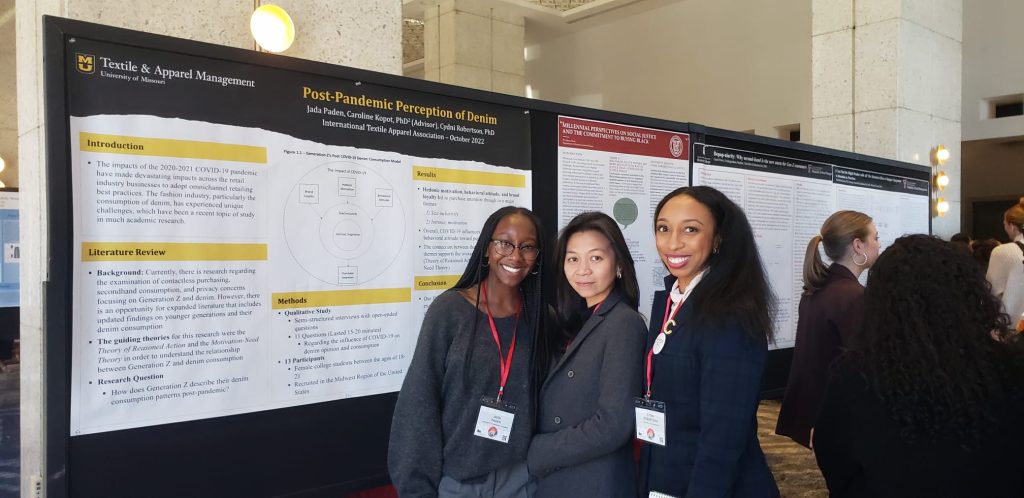Published on Jan. 24, 2023
For many honors students, the opportunity to get involved in research early in their undergraduate career is one of the benefits of being in the Honors College.
University of Missouri Honors student Jada Paden is no different. With one of her professors and a graduate research assistant, Paden has pursued research in textile and apparel management… all while working toward a degree in biological sciences.

Originally from Wentzville, Missouri, Paden began her college career as an international business major. However, she found the business world to be more profit-driven than she initially expected.
Motivated by a love of science and a desire to find a career with more of a human-focused impact, Paden switched her major to biological sciences with an emphasis in human health. Her end goal is to become a dentist and have her own practice.
“I’ve always wanted to have a career where—and I know it sounds cliché—I make a difference,” Paden said. “I have always been really good at science and really enjoyed it.”
Paden’s international business background is by no means a waste of time, however, as it provides her with baseline business knowledge she’ll need if she has, as she hopes, her own private practice someday.
“I still think it was really cool to have a year and a half of that business experience, and it has taught me a lot,” Paden said. “When I was shadowing this summer, a lot of it was getting a business mindset regarding dentistry. The dentist that I was shadowing spoke a lot about the business side of it, and so I was able to understand him and able to have more conversations with him.”
While she was an international business major, Paden began doing textile and apparel research into the denim consumption of Gen Z and how it changed after the COVID-19 pandemic. Now, even as a biological sciences major, Paden continues her research with Mizzou textile and apparel management professor Dr. Caroline Kopot and graduate research assistant Cydni Robertson.
“It’s mainly about how people feel about clothes,” Paden said. “And so, we’re looking at mainly the social aspect of why people buy [denim]. Why do people want to buy things? What influences them? Who influences them?”
Paden’s research has immediate practical application. Answering these fundamental questions about denim equips clothing companies with the information they need to create products that consumers really want. In the post-COVID world, the answers to these questions are also rapidly shifting, and brands are focused on responding to these changes.
Paden spends approximately two hours a day on her research. Oftentimes, she scours the internet for articles related to denim consumption, looking to prove her theories.
Earlier this year, Paden attended and presented her research with Dr. Kopot and Robertson at the International Textile and Apparel Association’s annual conference in Denver, Colorado.
“I think she was standing for about two hours. I cannot believe the fact that she almost didn’t stop talking for two hours,” said Dr. Kopot. “She was so worn out afterward because people just keep on coming, asking about her research. She explained her research nonstop. But that also shows how her research was very interesting to a lot of people.”
Getting into the conference is not easy. If accepted, applicants quickly turn around their papers to meet the conference’s short deadline. Researchers compete while they present their findings at the conference.
“Jada ended up winning a research award,” said Robertson. “And she got to present this at her very first conference at ITAA, which was fantastic. She did a great job.”
Paden and Dr. Kopot are just one of the countless student-faculty pairings at Mizzou that generate real and meaningful research. Students can work with faculty to explore topics in a wide variety of fields, from journalism to engineering. As one of the nation’s top research universities, Mizzou offers significant to the research opportunities to undergraduate students.
“It is a time commitment. I wouldn’t expect the normal student to want to be a research student because it’s just not practical for the normal person who wants to do their work and rest,” said Paden. “But if you’re willing to put that time in, definitely do it because it looks so good on a resume.”
With added learning and resume benefits, these opportunities certainly help undergraduate students at Mizzou. They are also a significant part of what makes Mizzou graduate students successful.
“It gave me the chance to learn how to teach an undergraduate student the basics of research, but also reinforcing what I knew myself as a Ph.D. student,” said Robertson. “So preparing me for the teacher role, but also making sure that I was able to coach Jada through each stage of the research development process.”